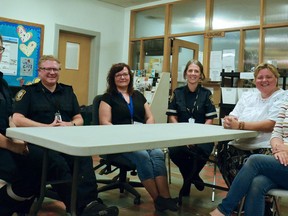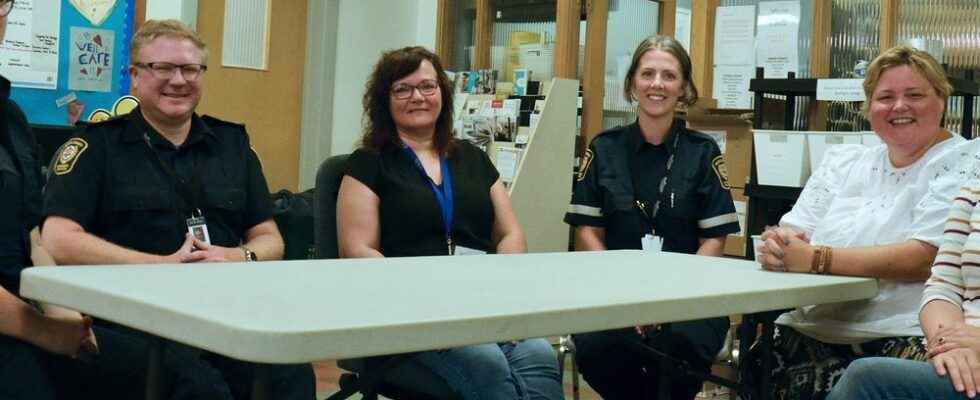Through partnerships with local service providers from across Stratford and beyond, the Stratford Connections Center is helping to forge relationships and trust between vulnerable people in the community and those who have the ability to help.

For the people who work at the Stratford Connections Centre, establishing friendly, trusting relationships with the people they serve is one of the most rewarding parts of their jobs.
As reflected in its name, the centre’s mission is to connect homeless and other vulnerable people in the community with supports and the local service agencies that can help them with everything from medical and mental-health care and food insecurity to employment and housing.
“The connections center really was built on the idea that a lot of folks who are … more vulnerable in our community are having difficulty accessing supports because they’re all over the place,” said Tanya Hefkey, the co-ordinator who manages the center on behalf of Choices for Change, a local organization that specializes in addictions counselling.
“Typically in the past, a lot of social or human services have worked in silos … and there’s not a lot of (connections between them). … So to bring it to one space, even if it’s not all the time, (vulnerable people) can get familiar with the access points … and (we can) really begin breaking down those barriers.”
Those barriers can include a lack of personal identification, a lack of access to internet or phone, or even just not having someone in their corner who can offer support as they reach out for help.
Hefkey says familiarity with the people behind the local service agencies and having an understanding of how they can help gives vulnerable people in Stratford somewhere to turn when they’re ready to seek that help.
One of those service agencies that has a regular presence at the center is the Perth County Paramedic Service and its mobile integrated health team.
“One of the things that paramedic services does, and has always done, is we connect with everyone in the community,” said Mike Adair, the service’s chief. “We go into people’s homes. We help people who are precariously housed. We support people who are homeless. When we talk about silos, we’re (an organization that) kind of the naturally breaks down those silos.”
By being a regular fixture at the centre, paramedics and the mobile integrated health team can forge relationships with vulnerable people who may not be comfortable seeking medical or mental-health supports on their own. Those relationships allow the paramedics to become someone’s friend while regularly checking in on their health and well-being while offering advice, treatment or referrals.
“A few times I’ve shown up here to provide COVID vaccinations to people who do not have a fixed address,” paramedic Alyssa Mole said. “It makes it easier because this is somewhere they’re familiar with and feel comfortable as opposed to asking them to go to … one of those mass-vaccination clinics where they might feel a little bit out of place.”
Another person who spends time each month at the connections center is Stratford Public Library public services supervisor Shauna Costache.
Costache says people experiencing homelessness, as well as other vulnerable residents, traditionally rely on the library as somewhere they can warm up or cool down, access the internet, take a nap or even find something to read.
Prior to the connections centre, Costache said staff at the library really weren’t trained to handle any kind of mental health or other crisis. In working with the centre, Costache says library employees are continuously being trained on how to best serve vulnerable people as a front-line service provider.
“Basically, I just come as a friendly face from the library who can connect them with any resources from the library, but also just to get them used to me specifically because, if someone goes into crisis at the library, I’m typically the person handling it,” Costache said. “So if they see me as a friendly person outside of that – if I go to help them when they’re in crisis – it’s not nearly as intimidating.”
As a result of this partnership, Costache said the library has been able to resolve a longstanding barrier for people without personal identification or fixed addresses who want library cards.
“That used to be a barrier … so we talked to Tanya about whether I could come here and she could vouch for people so I could give them a card and they could then go and get the rest of their ID, which starts a whole chain of events like being able to get housing and finding employment.”
While not everyone who visits the center is ready to seek work, Conestoga Career Center employment, career and customer-service liaison Christy Bertrand spends an hour at the center every Thursday to meet with people, forge those all-important relationships and start conversations about possible employment goals.
Bertrand, who herself was homeless for three months after getting into a collision that resulted in her losing her job and housing, said she understands the people she meets at the center are at many different stages in their lives. Some simply aren’t at a point where they’re ready to take on a job with co-workers, customers, a boss and everything else that comes with it, she noted.
“I have no agenda except conversation,” she said. “The first day I came, I had this sign that said, ‘What’s the funniest job you ever had?’ … People came through the door and they saw the sign … and they told me some great stories. … One of the first people who engaged with me told me he used to wear the tiger suit at Giant Tiger. … So we had a coffee and that conversation transitioned into some thoughts about the future. … He is working at this time in hard labour, but he has different goals and that sparked a bit of a conversation. He was thinking maybe he could access better jobs.”
That’s the whole idea behind the center. It’s about having people who are capable of helping in different ways in a space where they can introduce themselves to those who may need their support without pushing services on them.
When someone is ready to make a positive change in their life, they already have a friend waiting in the wings who is ready, available and eager to help them.
A number of other local service agency representatives visit the center regularly or as required, including a Choices for Change court support worker, outreach staff and representatives from the Supportive Housing of Perth Program from Stratford social services, and community paramedics from Perth County Paramedic Services.
For more information about the Stratford Connections Centre, visit the Stratford Connections Center Facebook page, email [email protected], or call 226-921-1025.
Stratford Connections Center connections
- Shauna Costache from the Stratford Public Library is at the center on the fourth Monday of every month.
- Nurse practitioner Liz Callaghan is at the center Tuesdays from 1:30 pm to 3:30 pm
- Choices for Change opiate case manager Dana Campbell is at the center Wednesdays from noon to 5 pm
- Christy Bertrand from the Conestoga Career Center is at the center Thursdays from 1 pm to 2 pm
- Criminal defense lawyer Amy Robern is at the center Fridays from 3 pm to 5 pm
